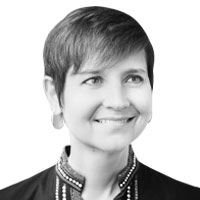When Hayat Sindi, a scientist, Cambridge grad and child of Saudi Arabia, launches a foundation this week to spur on young scientists in the Mideast, it will be just the kind of thing that might have helped her back when she was a budding scholar.
Sindi is known in scientific circles for her “social innovation,” as she calls it, such as co-founding a group at Harvard to develop a new technique for using tiny, cheap slips of paper and a drop of blood or saliva to diagnose liver disease, and perhaps eventually AIDS—potentially replacing costly lab tests. The technology, while still being tested, has the potential to save lives across the developing world.
“Scientists need to think about society,” says Sindi. “They need to think outside the box.”
Her achievements are remarkable considering the roots of her own academic career in Saudi Arabia, a place where women famously are forbidden to drive a car, date men, and—until last month at least—vote.
The Arab world is at a critical threshold for women, as dictatorships are challenged or upended in political protests stretching from Tunisia to Egypt to tiny Bahrain. Amid the upheaval, women such as Sindi offer a model for the next generation of young Arab women thinking about their own place in the world and balancing sometimes contradictory imperatives to be devout Muslims while also holding down professions, like men.
Sindi, who dresses in a traditional headscarf but also in trendy heels, relishes the details of making her own way in science. It started with a fib to her family after her first year of college in Saudi Arabia.

Keen to continue her studies abroad, she told her father some good news: She had been accepted at a prestigious university in London. Her traditional Muslim father said it would tarnish the family name for a young woman to live overseas alone. “He told me, ‘Over my dead body,’” Sindi recalls. Still, she persuaded him, and off she went to England.
The truth is, she hadn’t been accepted at any university. When she landed in London as a teenager in 1991, she says, she spoke only Arabic, no English. “My first night there, I went to a youth hostel,” she says. “I was in an attic room. I panicked. I looked at my plane tickets—my father had bought a return ticket. I thought, I’ll go home tomorrow.” Instead she went to an Islamic cultural center and got a translator to help her meet with college officials. “They told me, ‘You’re crazy,’” she says. “I was naive. I thought they would just let me in.”
After a year spent cramming on English and studying to pass the “A-levels,” the U.K.’s college-admission courses, she got herself in to King’s College, where she graduated in 1995 with a degree in pharmacology. She went on to get a Ph.D. in biotechnology from Cambridge in 2001. She says her family didn’t learn about her lie until years later, when they were surprised to hear her mention it in a speech.
Sindi recently wrapped up a stint as a visiting scholar at Harvard, where she co-founded Diagnostics for All, the organization developing the disease-diagnosing paper, which changes colors when dabbed with bodily fluids from a person who is ill. The idea is to make it simple even for someone who isn’t a doctor to quickly and cheaply diagnose disease in places where doctors or clinics might be nonexistent.
Sindi currently is a fellow at PopTech, a U.S.-based nonprofit that provides fellowships to scientists in an effort to foster global innovation. On October 21, at a PopTech conference in Camden, Maine, she will launch her own Mideast foundation, the Institute for Imagination and Ingenuity, which will help scientists write business plans, and find investors for their ideas. “I picture scientists finding new ways to purify water, or diagnose disease,” Sindi says.
A big obstacle for Mideast scientists, she says, is that they aren’t savvy about putting together a business plan; as a result, venture capitalists in the region are wary of investing in science. Sindi says she hopes to eventually expand her foundation to the U.S., and plans to split her time between both places.
It’s clear that she already dwells in both worlds, although Sindi has been living in the West for her adult life. Sitting in a coffee shop near the PopTech offices in Brooklyn, she wears a blue headscarf, suede heels and silvery eye shadow and jokes that scientists need not be geeks. And she describes her deep respect for her culture. “I’m very proud of where I came from,” she says. “Sometimes people think they need to completely discard their culture. But you have to hold on to your identity.”
In Saudi Arabia, the number of women in the workforce has nearly tripled since 1992, according to a study by consulting firm Booz & Company. But the number is still low for the region: The female participation rate in the Saudi workforce is 14 percent, compared with 59 percent in the United Arab Emirates. Saudi culture doesn’t make it easy for women to work. A male guardian must give permission if a woman wants to get a job. Sindi hopes she can help change that.
“My father was worried that, when I lived abroad alone, I would ruin the family honor,” she says. But in time he boasted to the neighbors, like any proud father. “When he died,” she says, “I found newspaper clippings about me under his pillow.”






